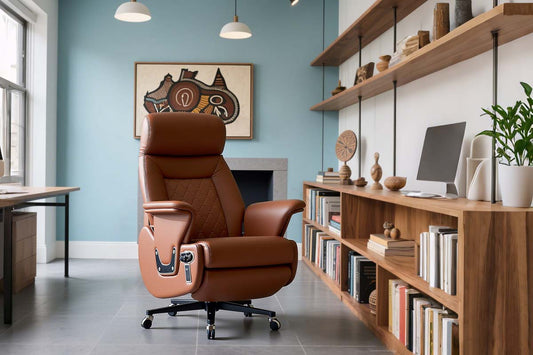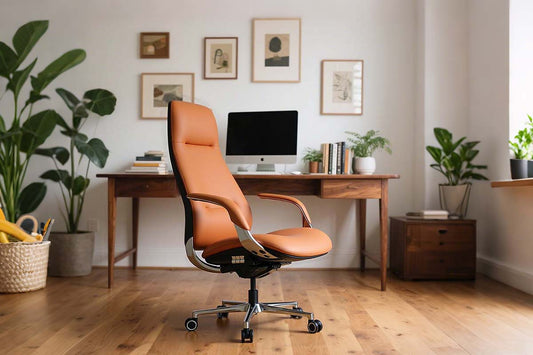
Emotional Comfort in the Workplace: Why a High-Back Chair Might Be Your Best Ally
Share
In an era where emotional value is increasingly prioritized, our tools for comfort go beyond ergonomics—they enter the realm of psychological safety. Surprisingly, one of the most important allies in your daily mental wellness might just be your high back office chair.

Why Does “Having Your Back” Matter—Psychologically?
In psychology, the concept of “having one’s back” is more than a metaphor. According to environmental psychologist Dr. Sally Augustin, humans have an innate desire to feel protected from behind. This tendency, rooted in evolutionary survival instincts, explains why we feel more relaxed when our back is covered—like sitting with a wall behind us or in a booth at a restaurant.
A high-back ergonomic executive chair mimics this protective enclosure. Its tall backrest can act as a psychological buffer, especially in open office environments, where visual privacy is limited. This creates a perceived "territory," reducing stress and enhancing focus. The effect is similar to what psychologist Edward T. Hall described as “proxemics”—the study of how we use space to feel safe.

How Does a High-Back Chair Stabilize Workplace Emotions?
Let’s examine three dimensions through which a high-back chair contributes to emotional well-being:
- Visual Stability: A tall back creates a vertical frame in the periphery, subconsciously signaling safety. It helps limit visual noise and interruptions from behind, which are known stressors in shared workspaces.
- Tactile Assurance: Materials such as genuine leather executive chairs offer softness and structural firmness, sending comfort signals to the sensory nervous system. The result? Your body registers a “no-threat” environment.
- Postural Confidence: A well-designed executive chair with back support aligns your spine, opening up the chest and shoulders. Research from Harvard Business School suggests that expansive postures can enhance feelings of control and reduce cortisol (stress hormone) levels.
Emotional ROI: The Measurable Value of Feeling Safe
A 2022 study by the American Psychological Association (APA) found that workplace stress and burnout are significantly lower among employees who report feeling "physically secure and emotionally supported" at their desks. Furthermore, a survey conducted by Future Workplace and View found that comfort and design of workplace furniture ranked in the top 3 factors contributing to employee satisfaction.
With remote and hybrid work redefining the role of personal workspace, investing in emotionally intelligent furniture is no longer a luxury—it’s a strategy. A thoughtfully designed ergonomic high-back chair isn’t just an aesthetic choice; it's a proactive mental health intervention.
Watch: Workplace Mental Health – What You Need to Know
In this TEDx talk, mental health advocate Tom Oxley explores the urgent need for emotional safety at work and how small design and policy choices—like the comfort of your chair—can contribute to overall mental wellness.
When workplace pressure becomes overwhelming and it's hard to speak up, a chair that offers both physical rest and emotional reassurance becomes more than a piece of furniture—it becomes a form of silent support.
Choosing the Right High-Back Chair for Emotional Comfort
Here are key features to look for when choosing a chair that supports both body and mind:
- Full back coverage (above shoulder level): Creates visual and postural enclosure.
- Memory foam padding and lumbar support: Offers both structure and softness, addressing both spinal and emotional needs.
- Soft but structured materials: Like top-grain leather or breathable mesh, which balance tactile comfort and professional aesthetics.
- Tilt and recline functionality: Gives you micro-agency over your posture—an overlooked factor in emotional autonomy.
Recommended Chairs That Balance Comfort and Psychology

Bowie Executive Chair
Ergonomic luxury with full-grain leather and 135° recline support.
View Product
Eloise Executive Chair
Elegant design, wide cushion support, and refined stitching details.
View Product
Fallyn Executive Chair
High-back structure with memory foam and soft neutral leather finish.
View ProductEmotional Ergonomics: The Future of Work
As emotional intelligence becomes a cornerstone of workplace design, furniture will continue to evolve from merely functional to psychologically enriching. A luxurious high-back executive chair can become a personal safe zone—a place where your spine aligns and your stress unwinds.
So next time you sink into your chair, ask yourself: does it just hold your body—or does it also hold space for your peace of mind?



